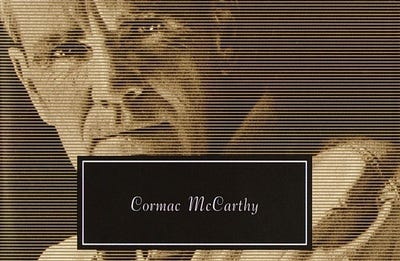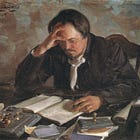This is a follow up to the essay The Failure of Cormac McCarthy and a continuation of the series on All the Pretty Horses, the first book in my Literary Analysis Series.
I knew that courage came with less struggle for some than for others but I believed that anyone who desired it could have it. That the desire was the thing itself. The thing itself. I could think of nothing else of which that was true.
—Cormac McCarthy, All the Pretty Horses
As Dueña Alfonsa made her final speech, I was reminded of Ellis Bell, the uncle whom Ed Tom visits at the end of No Country for Old Men. Her monologue and the conversation between Ellis and Ed Tom serve the same purpose. It contextualizes all that has come before it, which isn’t to say that it explains what we’ve read. In the case of Ellis Bell, it complicates what had been simple, but Alfonsa gives a declaration that comes dangerously close to being a peg I’d hang the whole story upon. To do so would be a mistake, but the temptation remains.
Courage is constancy.
But first, let’s take care of some business—in 3 parts:
1. Easily Manage Your Subscription
Every Section has a toggle. Toggle on the ones you want to receive and toggle off the ones you don't.
This is part of The Re:Read Series.
To choose which series come to your inbox, go to:
https://literarysalon.thaddeusthomas.com/account
2.a. Paid subscribers—Open Word deadline.
I’ve presented a proposed deadline for the first flash stories. Check the Open World channel in our forum.
2.b. World Building—Open Word deadline.
Haly, the Moonlight Bard ✒️ is creating a Word Anvil Bible where we will track the lore as it grows. You can find out more at the forum.
2.c. I’m giving away paperback books
To the first ten people who join our reading group in the forum, and the forum is available to paid subscribers, only.
3. Not yet subscribed to Literary Salon?
Check out the deep discount you can keep forever:
Now, let’s discuss: Cormac McCarthy.
That all courage was a form of constancy. That it was always himself that the coward abandoned first. After this all other betrayals came easily
—Cormac McCarthy, All the Pretty Horses
I don’t write today’s essay to explain the meaning of Alfonsa’s speech. Instead I see in it a challenge to literary theory.
In preparation for my last essay in the series, I read a feminist critique that spoke of Alfonsa and Alejandra as villains, and that if Alfonsa’s hardships were meant to redeem her, they did not. I fear that our intersectional approach to narrative suggests that fiction must speak to all cases equally. Yet, if fiction were to attempt to do so, it would struggle to say anything at all.
Alfonsa herself suggests that she and John Grady are enemies, but that doesn’t make her and Alejandra the villains of the tale. That would suggest that the story presumes, along with John Grady, that Alejandra is the prize to be won. The fact is that John Grady went south in search of the past and found himself thwarted by the new ideals of feminism. He was always destined to fail, and had he found the past, he would have thwarted by patriarchy. Perhaps here, he is frustrated by both, but it is feminism that is given the stage, not to make it the villain, but to make it the foil to John Grady’s foolish idolizing of a past that was partially lost and partially never existed. The prize of the story is a chance to come to terms with the world as it is, not as we wish it to be. Horses and Old Men are similar in this regard, and both require this shift of context to see the world of the story from beyond the presumptions of its central characters.
It is perhaps paradoxical that I say Alejandra is not the villain when now I suggest that she plays the role of Anton Chigurh in this tale, but Anton is the villain because of what he represents. Alejandra is a representation of humanity shaped and squeezed by the forces of the past that birthed her, both a dictatorial patriarchy and a rebellious feminism. We see the concepts suggested early on in another suggested villain, John Grady’s mother, who found in the death of her father a freedom from bondage to the ways of the past. She abandons the ranch, her dying ex-husband, and her son to pursue the life long denied her—and if she is seen as a villain, it’s only because this is her son’s story and not her own.
If Alajandra and Alfonsa are to be considered villains, it’s for the same reason—but to hold onto that presumption we must treat the story like any other western. To do so is to lie. It strips the McCarthy’s tale of everything true and replaces it with formula. We rewrite the story in order to condemn it.
The villain of the story isn’t either of these ladies nor even the various faces of Mexican (in)justice. Many of you will hate me for saying this, as many of you cried over him, and well you should, but even so, Jimmy Blevins is this story’s villain. He is the personification of the boys’ impulsive and immature pursuit of the past. He is the truth about themselves that John Grady and Rawlins refuse to see. He is that thing beyond John Grady’s control that strips from him all he dreamed of holding.
Discover all my essays on:
I told you things I've never told anybody. I told you all there was to tell.
What good is it? What good?
I dont know. I guess I just believe in it
—Cormac McCarthy, All the Pretty Horses
A novel need not, perhaps should not, convey all truths and represent all realities. The value-focused analyses have merit, but they also represent a danger for the author who would take them to heart. This doesn’t absolve McCarthy for his weakness in portraying women, but not every novel—
Stop right there. The purpose for literary criticism from a feminist perspective is to help correct a history of poorly represented women and poorly respected women authors. Highlighting the ways a book fails in this regard is important, and our argument cannot be that not every novel need to be a feminist manifesto, not when we’ve had such a bad showing.
As a whole, we need to strive to do better in so many areas, but it’s okay if a particular novel fails in some. Does All the Pretty Horses fail? I don’t think I’m the one to judge that, but I believe it earns its place as McCarthy’s most valiant effort to depict women. I appreciate, respect, and believe the character of Dueña Alfonsa.
What of Alejandra? As I’ve stated, she’s representational more than she is a full character. As for their romance, I believe in its beginning and end, but I feel like I missed something in the middle. It’s very possible that I literally did.
I also believe that a novel that focused on Alfonsa and Alejandra would be a feminist novel and that All the Pretty Horses uses feminist themes to its own end—telling the story of a boy coming to terms with the time in which he’s been born.
Final Thoughts:
I believe its telling that without Blevins, John Grady would never have strayed into Alejandra’s world, but once there, without Blevins, he could have stayed. A foolish desire for the past brought them together, but the realities of their present day tore them apart.
Blevins died because he couldn’t leave the past behind. He thought he would die by lightning like those before him, and he thought he was owed all he lost to the storm, those things he promised John Grady he would leave behind. The gun he used so well and which once seemed to be his forever was stripped away, and he went back to reclaim what was already lost. Exchange the gun for the ranch, and now you have John Grady’s descent into Mexico. They are the same thing.
— Thaddeus Thomas
Visit the Literary Salon bookstore:
Weekly Flash Fiction for Paid Subscribers—these won’t be emailed to you, but you’ll find the link in my regular posts. Here’s a fantasy flash fiction story for you:






Hey man this offered a new perspective for me. Thank you.
Loved the essay! I do want to offer a small observation that might help illuminate the middle of the love affair between Grady Cole and Alejandra. I don’t believe it’s something inexpressible, or something literature has yet to articulate. Rather, it’s that a love affair—truly shared between two people—is a kind of divine mystery. We can describe what they do, how they move, what they think. But the thing itself—that luminous, burning center—is only ever approached apophatically, through what it is not.
I believed it because I’d lived something similar—an experience that made the story feel deeply familiar. And yet, just as I could never fully grasp what passed between Grady Cole and Alejandra, I can barely make sense of that episode from my own youth.